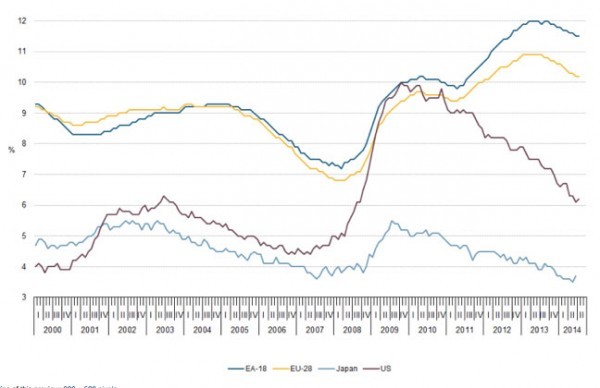What are they?
All of them are economic
phenomenons.However, their impact on interest rates, purchasing prices
and overall employment are vastly different.
Why does inflation happen?
- Demand-pull factor: Too many dollars(demand), too few goods(supply). Strong consumer demand.
- Cost-push factor: Increases in wages and raw materials cause production cost increases,hence goods prices to increase.
Why do they matter to business ? Why do they matter to the investor?
- Inflation:
- For businesses, inflation might be pushing the revenues up and
overstating the earnings. Therefore, when an intelligent investor
analyzes the financial statements, bear in mind the inflation and the
technique used to value inventory.
- For fixed income investors, a rise in inflation will automatically
affect your real return, i.e. purchasing power of your investment. If
your return is 10% (nominal interest rate), but inflation is 4%, your
real return is only 6% (real interest rate). Remember to look at the
real interest rate, not the nominal interest rate, as so many investors
OFTEN do!
- If an unanticipated inflation happens, creditors lose, menu cost
goes up, thus reducing spending and exporters are not competitive (due
to high manufacturing cost).
Where are we now?
According to Bill Gross, we are at a cross road between inflation and deflation, as deflation potential concerns rise in Eurozone and Japan. The world is largely comfortable with inflation by introducing more money supply in the market, i.e. Quantitative Easing (QE) measures. Started by the Feds in the U.S, it was followed by ECB and now Japan's BOJ followed suit. Inflation is created to pay for the previous inflation, therefore deflation is not an option. Deflation would have stopped devaluing our currencies and hence our purchasing power, but no country in the world so entrenched in globalization and finance-based economy want to risk.
The magnitude of QE is huge, imagine USD
4,000,000,000,000 (4 million million dollars , or simply 4 trillion dollars) has been pumped into the US economy, not to mention USD 2 trillion in Japan and a trillion dollars by ECB. The money as we know it, was pumped into the system and did
nothing but inflate prices of assets, not commensurate with their actual
demand.If it was to increase productivity, innovation or even for infrastructure projects, it would have increased employment everywhere, and driven real demand-pull inflation. As Gross put it rightly ,"Prices go up, but not the right prices."
Wages remain stagnant in these countries; but more seriously soaring unemployment in Europe.Youth unemployment in more chronic in Europe - a staggering 21.7%, according to the latest
census.
 |
| Stagnant wages everywhere... so where's the money? (Credit: IMF, Eurostat, Thomson Reuters.) |
|
|
|
|
 |
| High youth unemployment rate. Where is their future? (Credit: Statista.com.) |
Comparing unemployment in Europe and the non-Eurozone economies :
 |
| While Japan is able to control its unemployment throughout the years of deflation, US has managed to bring down the rate officially. The same could not be said about Eurozone. (Credit: EconomicsHelp.org) |
What are we to do?
In general, an intelligent investor's strategies should be :
- To avoid timing the market
- To build a diversified portfolio
There are also specific strategies during different economic phenomenons.
The investment strategies during Inflation & Hyperinflation:
a) Continue to invest in stocks ( buy value stocks and commodity-producing stocks)
b) Avoid bonds ( since bond prices and yield drops when interest rate rises)
c) For US-based investors, mutual funds such as the Treasury Inflation Protection Security(TIPS) can be an investment choice.
d) Real estates
e) Gold
The investment strategies during Stagflation:
a) Invest in
'real assets' whose growth is not dependent on a growing economy,e.g.
commodities(gold) and real estates(sometimes).
b) Invest in defensive sectors - healthcare, education, utility, non-cyclical stocks.
The investment strategies during Deflation :
a) Avoid cash/stocks/real estates/commodities
b) Buy long-term bond fund for better yield
c) Invest in defensive sectors such as healthcare, education, food production, utilities, non-cyclical stocks
A summary of the write-up
is presented here below:
In Conclusion
At the moment, we are experiencing the inflationary stage. But it's not a truly healthy one because, while the financial economy thrives, the real economy falters. Bill Gross notes that investors must recognize that in the modern day inflation, it is a not sufficient condition for increasing wealth at the rate necessary to beat real inflation rate and allow us to afford a comfortable education, healthcare and retirement.
Although money-printing pushes inflation up in the short run, it isn't a healthy phenomenon in the longer run. Money-spending in the right way is the only way we can get ourselves out of the rut, and that means spending from fiscal side (the government spending using taxpayers' money to create more jobs), something that governments across the world seem to fail to do due to a widening deficit in the budget. Gross notes that Jim Grant's (economic historian) prediction of a world deflation remains possible because of this, not in a good kind though : but "the kind that's trouble for prosperity".



